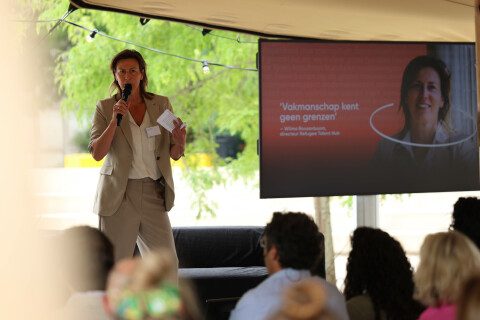
20 juni 2025
Opinie: Benut het talent en vakmanschap van nieuwkomers
We laten talent onbenut. Nieuwkomers moeten vanaf dag één aan de slag kunnen, betogen Erik Ziengs en Wilma Roozenboom.

Het is vandaag Wereldvluchtelingendag: een internationale dag die door de Verenigde Naties in het leven is geroepen om de aandacht te vestigen op het lot van vluchtelingen wereldwijd. Aan aandacht voor vluchtelingen ontbreekt het niet in het Nederlandse politieke en maatschappelijke debat. Maar in alle rumoer gaat het te weinig over hun lot, en nog minder over hun talenten. Wij roepen partijen op om in de aanloop naar nieuwe verkiezingen een ander gesprek te voeren. Een gesprek over mensen, vakmanschap, het voorkomen van brainwaste en het benutten van talent.
Er zijn bijna 400.000 vacatures in Nederland. Alleen al werkgevers in de sectoren techniek, bouw en energie zoeken volgens brancheorganisaties de komende jaren 50.000 nieuwe collega’s. Tegelijkertijd wonen er op dit moment ongeveer 300.000 nieuwkomers in Nederland – asielzoekers, statushouders en Oekraïense ontheemden bij elkaar opgeteld. Asielzoekers zijn nog in afwachting van het besluit over hun asielaanvraag. In 2024 werd ruim 75% van de asielaanvragen gehonoreerd; het overgrote deel van deze mensen blijft dus in Nederland. Hun arbeidsdeelname is laag, zo rond de 12%, maar hun wil om te werken is groot. De arbeidsparticipatie voor statushouders en Oekrainers ligt met respectievelijk 55% en 59% aanzienlijk hoger, maar nog steeds ver onder het Nederlands gemiddelde van 73% (cijfers CBS). Hier zit een groot onbenut arbeidspotentieel. Dit niet benutten is een brainwaste en kapitaalvernietiging.
Vorig jaar concludeerde onderzoeksbureau SEO dat het de Nederlandse samenleving bijna €2 miljard extra welvaart oplevert in tien jaar tijd als asielzoekers eerder aan het werk gaan. En als we het hebben over statushouders: Social Finance NL voerde een impactanalyse uit voor een project gericht op zorgprofessionals met een vluchtelingen- of migratieachtergrond in Groningen. Hieruit blijkt dat elke geïnvesteerde euro bijna €2,50 aan maatschappelijke baten oplevert. Denk aan besparingen op uitkeringen, lagere wervingskosten voor ziekenhuizen en een hogere financiële zelfredzaamheid van deelnemers.
Macro-economisch is het dus een goed verhaal. Bedrijfseconomisch ook. Het inwerken van nieuwkomers vergt tijd en aandacht van werkgevers, maar de investering loont: onder andere McKinsey toonde aan dat bedrijven met een divers personeelsbestand beter presteren, en Amerikaans onderzoek leert dat medewerkers met een vluchtverleden tot drie keer langer bij een werkgever blijven.
En dan is er het maatschappelijke en menselijke perspectief. Vluchtelingen hebben kennis, ervaring en talenten waarmee ze kunnen bijdragen aan de Nederlandse arbeidsmarkt. En dan is een baan zoveel meer dan geld verdienen. Werk is de snelste weg naar integratie. Op je werk leer je de taal, cultuur en mensen kennen. Het is structuur in je dag, sociaal contact, het gevoel van waarde te zijn en iets bij te dragen. Het is onlogisch, onverstandig en onmenselijk.
Vandaar onze oproep in de opmaat naar de campagne voor nieuwe verkiezingen. : focus op toegang tot de arbeidsmarkt.
Of, een tandje concreter, drie aanbevelingen:
- Vervang de tewerkstellingsvergunning (TWV) voor asielzoekers door een meldplicht, zoals het ook voor Oekraïners geldt.
- Start met inburgering voor statushouders in de azc’s, zodat mensen sneller kunnen starten met het werken aan hun toekomst en niet hoeven te wachten tot ze een woning hebben.
- Zorg voor landelijk beleid in plaats van gemeentelijke verschillen zodat het voor landelijke werkgevers niet meer uitmaakt uit welke gemeente ze iemand aannemen.
Benut het talent en vakmanschap van mensen die in Nederland zijn. Hoe je ook staat in de discussie over nieuwkomers die politiek Den Haag al jaren bezig houdt: voorkom brainwaste.
Erik Ziengs is voorzitter van ONL voor Ondernemers en voormalig Lid van de Tweede Kamer voor de VVD. Wilma Roozenboom is directeur van werkgeversinitiatief Refugee Talent Hub.